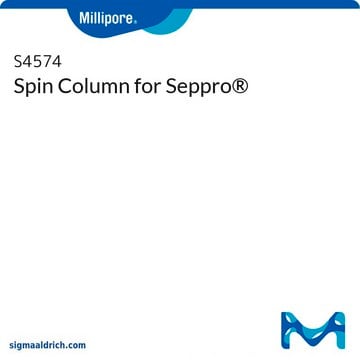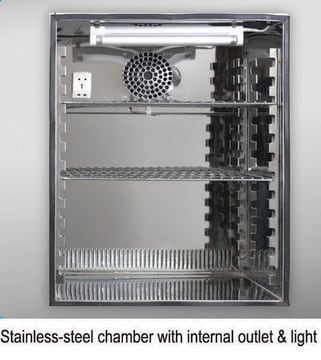One suggestion is to use PBS with 0.05% Tween 20. Extraction with urea/SDS is not suggested because this is incompatible with the antibodies in the Seppro products.
Wichtige Dokumente
SEP080
Seppro® Rubisco
LC2
About This Item
Empfohlene Produkte
Säule D × L
6.4 mm × 63 mm
Kapazität
1 mg total protein loading(D-Ribulose 1,5-Diphosphate Carboxylase (Rubisco))
Lagertemp.
2-8°C
Suchen Sie nach ähnlichen Produkten? Aufrufen Leitfaden zum Produktvergleich
Allgemeine Beschreibung
Anwendung
Rechtliche Hinweise
Lagerklassenschlüssel
10 - Combustible liquids
Hier finden Sie alle aktuellen Versionen:
Analysenzertifikate (COA)
Die passende Version wird nicht angezeigt?
Wenn Sie eine bestimmte Version benötigen, können Sie anhand der Lot- oder Chargennummer nach einem spezifischen Zertifikat suchen.
Besitzen Sie dieses Produkt bereits?
In der Dokumentenbibliothek finden Sie die Dokumentation zu den Produkten, die Sie kürzlich erworben haben.
-
How can I extract my plant proteins for use with Seppro® Rubisco kit, Product SEP080?
1 Antwort-
Hilfreich?
-
-
I originally purchased my Seppro RuBisCO LC2 column from Genway. Can I still contact Genway for technical support?
1 Antwort-
All inquiries on the Seppro technology are now to be referred to Sigma-Aldrich. Customers should not contact Genway for technical assistance.
Hilfreich?
-
-
What is the Department of Transportation shipping information for this product?
1 Antwort-
Transportation information can be found in Section 14 of the product's (M)SDS.To access the shipping information for this material, use the link on the product detail page for the product.
Hilfreich?
-
-
Can I do TCA/acetone precipitation for isolating plant proteins to use with the Seppro® Rubisco kit, Product SEP080?
1 Antwort-
TCA/acetone precipitation is problematic because it may be difficult to redissolve the protein pellet afterwards. The following paper provides some tips for extraction: Cellar, N.A., et al., J. Chromatography B, 861, 29-39 (2008).
Hilfreich?
-
-
How does the storage temperature relate to shipping conditions?
1 Antwort-
The storage conditions that a Sigma-Aldrich catalog and label recommend for products are deliberately conservative. For many products, long-term storage at low temperatures will increase the time during which they are expected to remain in specification and therefore are labeled accordingly. Where short-term storage, shipping time frame, or exposure to conditions other than those recommended for long-term storage will not affect product quality, Sigma-Aldrich will ship at ambient temperature. The products sensitive to short-term exposure to conditions other than their recommended long-term storage are shipped on wet or dry ice. Ambient temperature shipping helps to control shipping costs for our customers. At any time, our customers can request wet- or dry-ice shipment, but the special handling is at customer expense if our product history indicates that the product is stable for regular shipment.
Hilfreich?
-
Aktive Filter
Unser Team von Wissenschaftlern verfügt über Erfahrung in allen Forschungsbereichen einschließlich Life Science, Materialwissenschaften, chemischer Synthese, Chromatographie, Analytik und vielen mehr..
Setzen Sie sich mit dem technischen Dienst in Verbindung.





